Serendip is an independent site partnering with faculty at multiple colleges and universities around the world. Happy exploring!
Guns, Germs and Steel
Towards Day 8 of Evolving Systems course

I. coursekeeping
we'll exit for cake-cutting on Merion Green @ 12:30
what would you say to a class visit from President McAuliffe?
continuing to name one another....
by Monday evening, post on-line your reactions
to our upcoming discussion about cultural evolution:
we're moving on now, from looking @ change in the universe, in geology, and in biological systems, to thinking about the changes that take place in human cultures. What sorts of links did you expect to see, or not, between changes in the physical world and other kinds of change? To what extent do you think that cultural change has patterns and explanations similar to those involved in cosmological, geological, and biological changes?
by Wednesday evening, e-mail the first paper in our next sequence (looping back again to begin w/ what you know already...
before nudging into some as-yet-unknown spaces...): write about the evolution of a culture with which you are familiar. Be clear about how you know what you know.
in preparation: reading a pair of papers about the soul...what are their sources for the claims they make? what claims are they making?
from my non-fictional prose course, Arne Naess' The Ecology of Wisdom: "We cannot give good reasons for everything. We stop somewhere, normally outside science, and doing this, we may, if appropriate, quote Aristotle. We can say that belief in the possibility of proving everything shows a lack of education and that we like to be considered educated" (p. 300).
ongoing question: how to incorporate scientific knowledge into our myths? for a great example, see My Great-Granddaddy was a Monkey
II. Moving today to the work of another storyteller (a geographer), who will carry us from stories of the
universe to stories about culture: Jared Diamond's "Variables" is our bridge text.
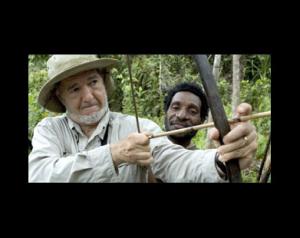 |
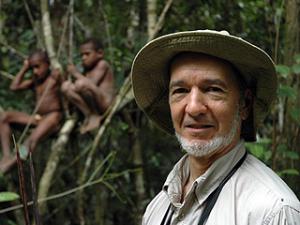 |
Jared Diamond attempts to answer the question of why Europeans came to dominate the world rather than, say, New Guineans or Aztecs. He concludes that geography is the key factor. Eurasia, with its huge ... tracts of land ... contained the most plant and animal species suitable for domestication. The opportunity to rely on food production rather than hunting and gathering allowed many Eurasian societies to become sedentary and develop civilization. The east-west orientation of the continent allowed plants, animals, and technology to spread quickly to other civilizations at similar latitudes. On other continents, even those societies that did develop agriculture that allowed them to grow beyond small bands of hunter-gatherers were confined by geographical factors to relatively small areas with little contact with other regions; consequently their technology lagged behind that of the Eurasians, while their immune systems, exposed to relatively few diseases, remained susceptible to visitors' germs. Thus, the fact that we do not live in a world in which aboriginal Australians colonized and enslaved the rest of the world is not mere happenstance.
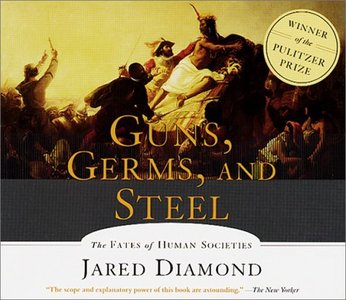
We asked you to look, for today, @ the particular selections from this text (reformatted for the web) that focused on the "variation" of crops, animals, germs, technology and geography. What are your initial reactions to this argument? What elements did you find compelling? Where did you find yourself questioning or resisting? What further sorts of storytelling does Diamond's account enable? (Always a good test for the use-value of a story: its productivity!)
A graphic representation of the study...
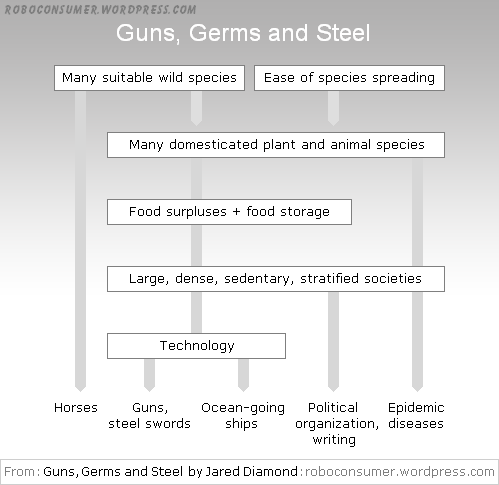
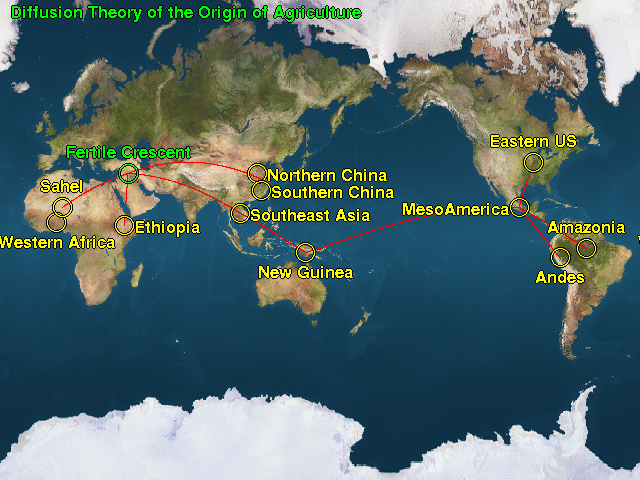
And what about China??
(from p. 454 of the 2003 Afterword:) "An area of active discussion since 1997 falls under a heading that could be termed "Why Europe, not China?... Why, among Eurasians, was it Europeans rather than Chinese or some other group that expanded?... argued in detail by Graeme Lang: "Differences between Europe and China in ecology and geography helped to explain the very different fates of science in the two regions. First, [rainfall] agriculture in Europe provided no role for the state ... and when the agricultural revolution in Europe produced a growing agricultural surplus, this allowed the growth of relatively autonomous towns along with urban institutions .... [Irrigation and water-control] agriculture in China, by contrast, favored the early development of intrusive and coercive states in the major river valleys, while towns and their institutions never achieved the degree of local autonomy found in Europe. Second, the geography of China, unlike that of Europe, did not favor the prolonged survival of independent states. Instead, China's geography facilitiated eventual conquest and unification over a vast area, followed by long periods of relative stability under imperial rule. The resulting state system suppressed most of the conditions required for the emergence of modern science.... Such explanations can always be challenged with a further question: why were Europe and China different with regard to those social or cultural factors?


